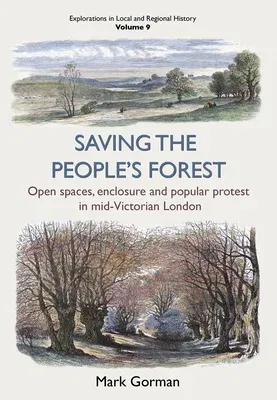Mark Gorman
(Author)Saving the People's Forest, 9: Open Spaces, Enclosure and Popular Protest in Mid-Victorian LondonPaperback, 1 June 2021

Temporarily out of stock
Free Delivery
Cash on Delivery
15 Days
Free Returns
Secure Checkout

Part of Series
Explorations in Local and Regional Histo
Print Length
256 pages
Language
English
Publisher
University of Hertfordshire Press
Date Published
1 Jun 2021
ISBN-10
1912260417
ISBN-13
9781912260416
Description
Product Details
Author:
Book Format:
Paperback
Country of Origin:
US
Date Published:
1 June 2021
Dimensions:
24.13 x
17.02 x
1.02 cm
ISBN-10:
1912260417
ISBN-13:
9781912260416
Language:
English
Pages:
256
Publisher:
Weight:
385.55 gm